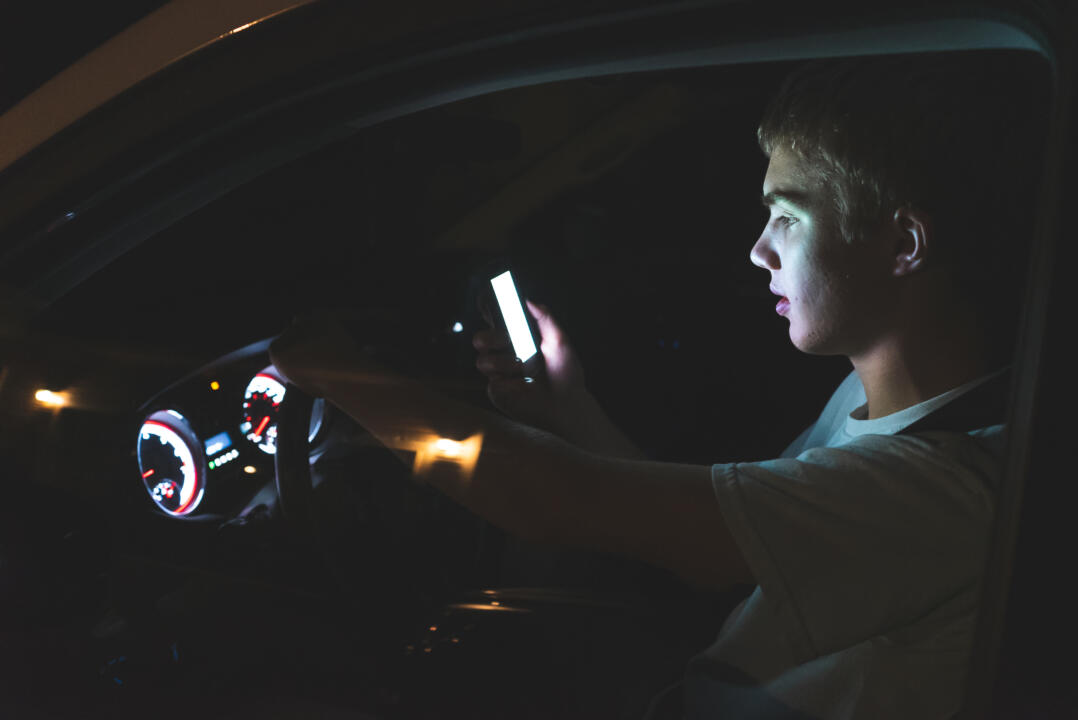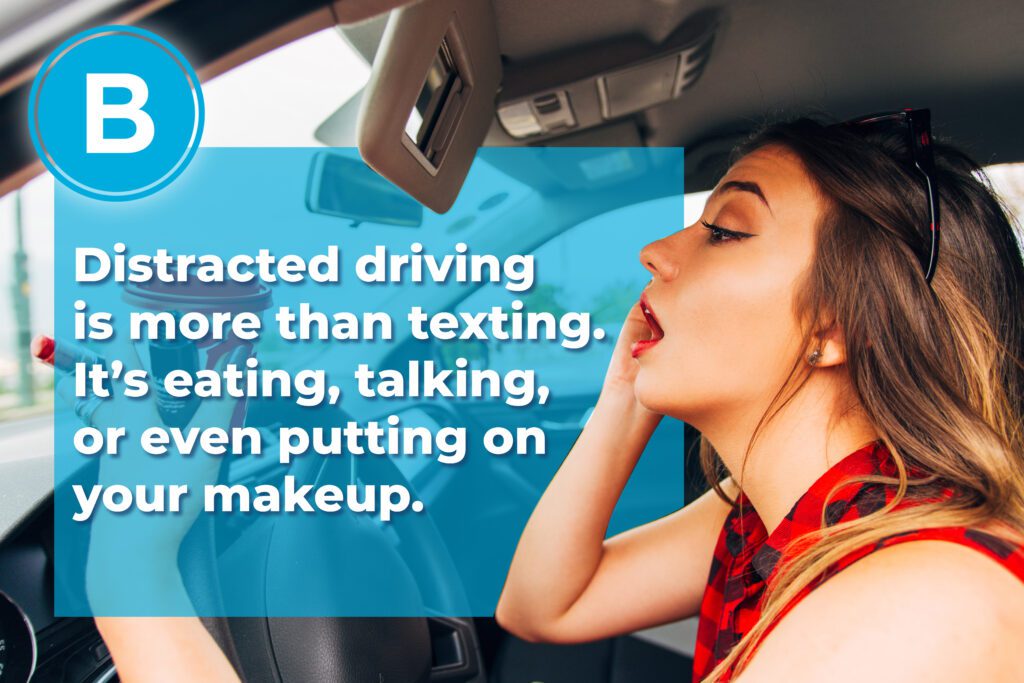
Our attorneys Steve Brooks and Beach Brooks III took to Facebook Live to discuss different types of distracted driving. Listen to the podcast and read ahead for the transcript.
S: Good afternoon, welcome to Wednesday’s Inside Look by Brooks! I’m joined by my co-host, Beach Brooks III. How are you doing today, Beach?
B: Doing pretty well, just enjoying the cooler weather. How about you, Steve?
S: Oh, I absolutely love it. This is my favorite time of year. It makes Florida such a great place to live. October through like, March, Florida is unbeatable.
Introducing Our Fall Scholarship
So, today we wanted to talk about our Fall Scholarship. We do a scholarship twice a year. With the fall one, the deadline is coming up December 3. And I think the topic this time is Distracted Driving: More Than Texting, is that correct?
B: That is correct.
S: We talk a lot about distracted driving. In my opinion, distracted driving is like the new DUI. And it’s primarily caused by texting, and sometimes by phone use. But if you’re in an 8,000 pound car going 60 miles per hour, and you look down for 2-3 seconds, you’ve just gone a football field. And you didn’t see what was happening during that 100 yards or 300 feet you just traveled. A kid could have run out in front of you, a car could have pulled out in front of you. So that’s why a lot of accidents are happening, and distracted driving is a real, real problem.
Normally when we talk about it, we talk about it in terms of texting. The scholarship is more about, tell me some other ways distracted driving happens.

B: Yeah, I mean when it comes to distracted driving, obviously like you said that includes texting, but there are many other ways drivers can be distracted. I know GPSs, not so many people use the actual GPS devices anymore (it’s more on your phone). But those can be very distracting, as well as passengers. Just talking to other people in the vehicle, stuff happening in the car, kids roughhousing in the back where you’re trying to get them under control. Anything like that is distracted driving. It’s taking your attention away from the other vehicles and the other drivers that are on the road. All of them can have deadly consequences, so at the end of the day just be smart while you’re driving.
Distracted Driving Is More than Texting
S: I totally agree. And I think that COVID has totally accentuated or accelerated distracted driving and texting. What I mean when I say that is drive-thru service has grown dramatically because a lot of restaurants and coffee shops have closed the inside services. So everybody went to drive-thru. But when you’re driving through and getting a sack full of food, or a cardboard thing full of coffee and drinks, and you’re doing all that while you’re driving—that’s a recipe for danger. So that’s one thing that I think of when I think of non-texting types of distracted driving.
B: And again, those drivers aren’t familiar a lot of times with where they’re driving to when they’re delivering the food or delivering the coffee. Also they’re taking their eyes off to the GPS. And I think there’s one scary stat I heard one time where one out of every four drivers on I-4 have never driven I-4 before. So they constantly don’t know where they’re going. They’re looking at the theme park attractions or they’re looking at their GPS, which all just takes your concentration and eyes off the road. So there’s many forms of distracted driving other than just texting.
S: What you said about I-4 is so true, and that’s why I-4 is one of the deadliest highways in the country. It’s because it’s full of unfamiliar people looking at maps, GPS, and all the stuff that tourists do.
Eliminating Mental Driving Distractions
S: One of the things that we teach here in the law firm is we teach our teammates and colleagues in the firm to set aside time—we call it “Do Not Disturb” time—to get their deep thinking work done. We actually have signs that people put up that say, “Do Not Disturb.” Because we found in studying this that if people are constantly answering questions to their coworker who’s walking by, or constantly responding to email, once you are distracted from your work, it takes you literally a couple minutes to get unfocused from your interaction with your coworker back to your work. Like, What was I working on? What was my train of thought? And so you lose some real productivity there.
Well the same thing applies. When you take your mind off driving and look to a French fry that fell on the floor, or the GPS, or whatever is happening, it takes time for you to refocus on driving when you go back to paying attention as a driver. So it’s not just the time you’re looking away—it’s that reacclimating to driving that is really important.
B: I know we’ve probably all done it before in the past where you’re driving home and it’s a route you go often. Then all of a sudden you’ve been driving for 2 to 3 minutes, and you don’t even remember making the turn. Because you’re just distracted or thinking about something else. That’s unsafe to the pedestrians, it’s unsafe to the other vehicles on the side of the road. And that goes right to your point of, you may have done something that only distracted you for a short period of time, but it took your mind somewhere else and it sometimes can take, as you say, a half minute or longer to refocus on what you’re actually doing, which is driving.

Leave Distractions at Work
S: Absolutely. You know, I take work home mentally. And I remember talking to some attorney about, How do you turn it off? How do you go home and not think about your cases? And it seems like when I’m taking a shower at night is when all my great ideas come and I don’t have any way to write them down! I’m just always thinking about it.
So this one guy suggested to pick a milestone—a billboard, a building—on your drive home and when you pass that billboard, that’s the time to turn off work and now be focused on just freeing up my mind. So I think, especially if you’re in a very heavily thought type of job (engineer, attorney, doctor) as you walk out the door where you’re working, have that mental image of, “I’m leaving work behind. I’m gonna free up my mind now. I’m gonna go drive and I’m gonna be home with my family.” Because it is hard for the folks in a very heavily thought type of profession to turn it off.
B: I give my best opening and closing arguments and my best arguments for a hearing when I’m driving. Because as I’m getting ready for the next day or in the morning driving to work if I have something going on that day, I’m constantly rehearsing it in my vehicle. So my steering wheel has heard some of my best arguments in my life!
Even though a lot of people are working remotely, that’s one thing I do enjoy about coming to the office and driving is it gives me that time and buffer.
S: It’s funny you say that. We had an employee when we were working remotely from home who had a difficult time transitioning from work to home because she was in the same house, she never drove anywhere. So at 5 o’clock she would get her daughter and get in her car, and they would drive around the block, and they would come back home. So that’s how Kimberly transitioned. I thought that was ingenious.
Other Causes of Distracted Driving
S: In your cases, Beach, what are some distractions besides what we’ve talked about, if you can think of any? Like GPS, food, coffee, cigarettes, or I know you mentioned passengers. Anything else?
B: Food is a big one. People eating when they’ve gone through a drive-thru. I’ve had it where females were trying to put on makeup, whether it be lipstick or eyeliner. I’ve had it where there’s been dogs in the vehicle that have distracted the driver. I had one where they were watching YouTube videos at the time of the crash.
But it’s amazing how many times you’re taking someone’s deposition and you realize the accident could have been avoided. They rear-end our client, and you say, “When did you first see our client?” And they say, “Right before I hit them,” even thought our client had been stopped for several seconds. That just means they were doing something other than paying attention to traffic and the cars in front of them. That’s the frustrating part is a lot of these car crashes could be avoided if people just put their sole attention on driving and the other vehicles on the road.
How to Prove that Someone Was Distracted Driving
S: So if you take a deposition of an opposing driver—and for those who don’t know, a deposition is just a way for us to put somebody under oath and get their statement about what their recollection of the facts are. If you’re deposing another driver, who we allege caused the accident, and they don’t admit to being distracted, how would you prove they were being distracted?
B: There are several different ways. Sometimes we’ll subpoena their phone records to see if they were, in fact, on the phone. Sometimes there are passengers in the vehicle. You can take their depositions as well. Sometimes there’s witnesses to the crash that say, “I saw them eating a hamburger. I saw them putting eyeliner on.” A lot of times when you run into the back of someone, it sort of speaks for itself. The car in front of you is stopped and either you weren’t following at a safe distance, or you weren’t paying attention.
But that’s one thing. Sometimes people deny that they did anything wrong, and that’s why you need to get us involved is because we have the tools and the knowledge to nail down that they were in fact distracted, or they were not paying attention, and were negligent. Or sometimes we can nail them down in a lie which is even better because no one likes a liar. Especially a jury.
Questions? Comments? Talk With Us!
S: Thanks for joining us today, thanks for being here and cohosting with me, Beach. As always, Beach and I are open to talking with anybody who wants to dialogue. Whether it’s about a case or just anything we’ve talked about today. Beach’s email is [email protected] and mine is [email protected]. So feel free to contact us! We’ll see you next Wednesday for Inside Look by Brooks. Thank you for joining us and we’ll see you later.













